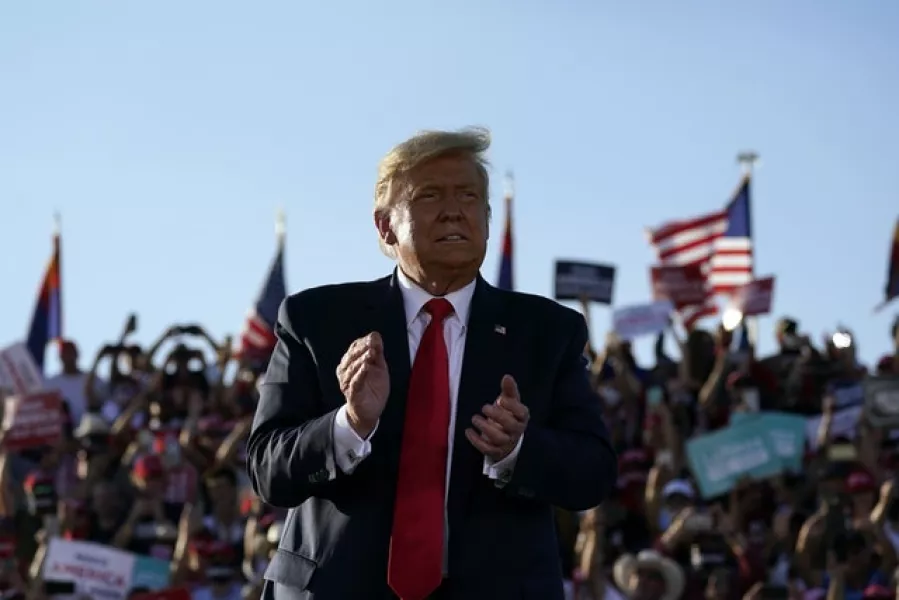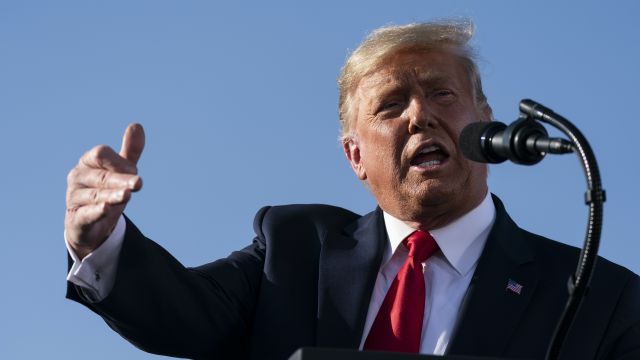On the third day of a western campaign swing, Mr Trump was facing intense pressure to turn around his campaign, hoping for the type of last-minute surge that gave him a come-from-behind victory four years ago.
But his inconsistent message, another rise in virus cases and his attacks on experts like Dr Fauci could undermine his final efforts to appeal to voters outside his most loyal base.
“I’m not running scared,” Mr Trump told reporters before taking off for Tucson, Arizona, for his fifth rally in three days.
“I think I’m running angry. I’m running happy and I’m running very content (because) I’ve done a great job.”
People are tired of hearing Fauci and all these idiots
His aggressive travel comes as Mr Trump plays defence in states he won four years ago, though the president insisted he was confident as he executed a packed schedule despite the pandemic.
“We’re going to win,” he told campaign staff on a morning conference call from Las Vegas.
He went on to acknowledge that he “wouldn’t have told you that maybe two or three weeks ago,” referring to the days when he was hospitalised with Covid-19.
But he said he felt better now than at any point in 2016. “We’re in the best shape we’ve ever been,” he said.
Seeking to shore up the morale of his staff amid growing private concerns that he is running out of time to make up lost ground, Mr Trump blasted his government’s own scientific experts as too negative, even as his handling of the pandemic that has killed nearly 220,000 Americans remains a central issue to voters.
“People are tired of hearing Fauci and all these idiots,” the president said of the government’s top infectious disease expert.
“Every time he goes on television, there’s always a bomb. But there’s a bigger bomb if you fire him. But Fauci’s a disaster.”
At a rally in Prescott, Arizona, Mr Trump assailed Mr Biden for pledging to heed the advice of scientific experts, saying dismissively that his rival “wants to listen to Dr Fauci”.
The doctor is both respected and popular, and Mr Trump’s rejection of scientific advice on the pandemic has already drawn bipartisan condemnation.
At his rally, Mr Trump also ramped up his attacks on the news media, singling out NBC’s Kristen Welker, the moderator of the next presidential debate, as well as CNN for aggressively covering a pandemic that is now infecting tens of thousands of Americans every day.
Monday’s professed confidence in victory stood in contrast to some of Mr Trump’s other public comments in recent days reflecting on the prospect that he could lose.
“Could you imagine if I lose my whole life? What am I going to do?” he asked a rally crowd last week in Macon, Georgia.
“I’m not going to feel so good. Maybe I’ll have to leave the country. I don’t know.”
In Janesville, Wisconsin over the weekend, he said it was not “even conceivable” that he could lose to a man he labelled “the worst candidate” in the “history of presidential politics”.
Mr Trump has also expressed confusion about polling data that shows him trailing or closely matched with Mr Biden in key states, given the crowds of thousands he has been drawing at every stop.
“How the hell can we be tied?” he said at a rally in Carson City, Nevada, where polls actually show Mr Biden is ahead.
“What’s going on? … We get these massive crowds. He gets nobody. And then they say we’re tied. … It doesn’t make sense.”
Late on Monday, the nonpartisan Commission on Presidential Debates announced that Mr Trump and Mr Biden will each have his microphone cut off in Thursday’s debate while his rival delivers his opening two-minute answer to each of the six debate topics.

The rule changes come three weeks after a chaotic opening face-off between the two presidential contenders that featured frequent interruptions — most often by Mr Trump.
The open discussion portion of the debate will not feature a mute button, but interruptions by either candidate will count toward their time.
The commission has faced pressure from Mr Trump’s campaign to avoid changing the rules, while Mr Biden’s team was hoping for a more ordered debate.
In a statement, the commission said it “had determined that it is appropriate to adopt measures intended to promote adherence to agreed upon rules and inappropriate to make changes to those rules.”







